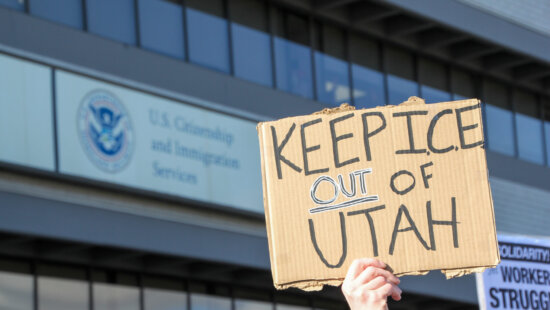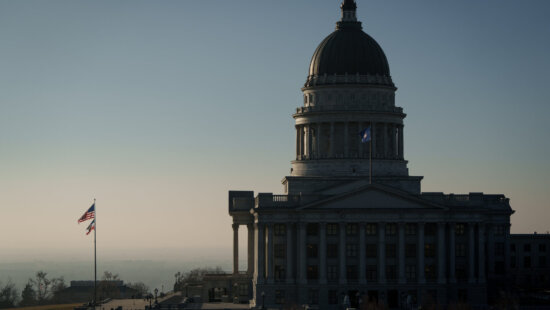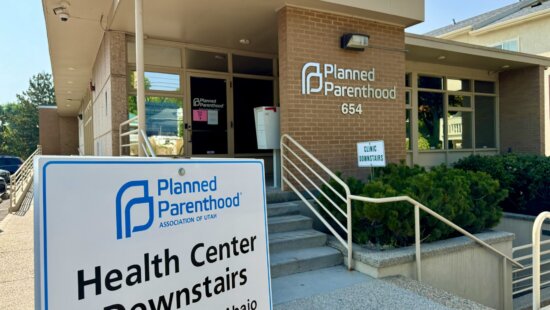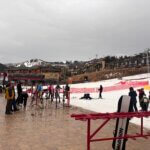News
Curtain falls on 2024 Utah Legislature. Here’s what happened
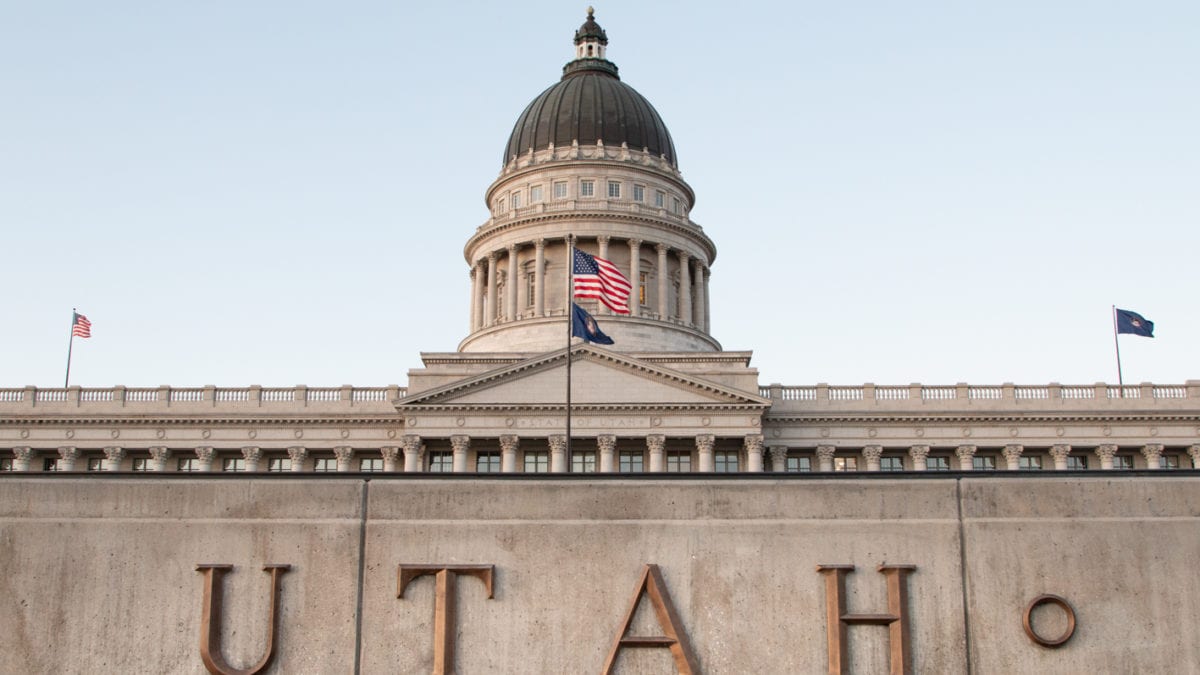
The Utah State Capitol building in Salt Lake City. Photo: TownLift // Bailey Edelstein
In a session underscored by an election year, lawmakers cut taxes while funding sports stadiums, tackling transgender restrictions, DEI, energy, and more
By: Katie McKellar, Alixel Cabrera and Kyle Dunphey, Utah News Dispatch
The Utah Legislature’s marathon, 45-day general session came to an end Friday shortly before midnight after legislators finalized the state’s $29.4 billion budget and pushed a record-breaking 591 bills across the finish line — 16 more than last year.
The 2024 session — which opened in a presidential election year that’s expected to be as heated and polarizing as ever — began with debates over two politically divisive issues: transgender restrictions in bathrooms, and a ban on diversity, equity and inclusion programs.
The GOP-controlled Legislature prioritized those bills during the early days of the session that began Jan. 16 and propelled them swiftly through the legislative process. Both were buttoned up and signed by Gov. Spencer Cox within two weeks.
Lawmakers then plowed ahead to deal with weighty environmental issues. Those included setting a statewide energy policy that prioritized reliability and affordability over an abrupt transition to clean energy. Republican legislators’ fights with the federal government were center stage as they worked to keep coal-fired plants open despite federal regulations.
Several water bills also made waves, including one to pull mineral extraction companies to the table when it comes to helping save the shrinking Great Salt Lake.
Legislative leaders spent weeks finalizing more than $2.7 billion in new spending, which included:
- $1.2 billion for investment in new infrastructure
- $832 million for public education and $188 million for higher education
- $113 million for law enforcement
- $300 million in subsidized loans for affordable housing projects
- $60 million for homelessness and services
- $167 million for an income tax cut
However, many budget requests didn’t get funded, with legislative leaders citing a tighter budget year compared to recent years due to a cooling economy and the end of COVID-19 federal subsidies. They still, however, prioritized about $170 million in tax cuts.
Donning hockey and baseball jerseys, lawmakers also excitedly pushed a pair of bills to use almost $2 billion in future tax dollars to help build sports stadiums in Utah’s capital city. Lawmakers hope the subsidized stadiums will attract Major League Baseball and National Hockey League teams — and also spur major redevelopment in Salt Lake City’s west side and downtown.
The Utah News Dispatch team followed all of these issues — and more — throughout the session. Here are the highlights:
LGBTQ+ issues, transgender restrictions
It was another year of legislation aimed at transgender people, this time to restrict them from bathrooms and locker rooms in government-owned facilities, with limited exceptions. HB257 also expands access to unisex and single-stall facilities.
Soon after the governor signed the bill, with transgender issues still fresh on Utahns’ minds, Utah State Board of Education member Natalie Cline stirred outrage when she posted a photo on Facebook of a female high school basketball player, incorrectly suggesting the girl was transgender.
Local and state officials swiftly condemned her, and the state school board stripped her of many of her elected privileges. While Democrats wanted to impeach her, Republican legislators opted to not go so far and instead issue a censure, which condemned her action but had no legally binding effect.
Other bills dealing with LGBTQ+ issues, though not as high profile as the transgender restrictions, also made their way through the Utah Legislature, but were either changed to respond to LGBTQ+ advocates’ concerns or failed.
- SB150, a bill to codify the state’s own version of the Religious Freedom Restoration Act, passed after lawmakers struck a compromise with LGBTQ+ advocates and clarified it is not meant to conflict with previously legalized discrimination protections for LGBTQ+ people.
- HB303, a bill that would have restricted teachers from displaying LGBTQ+ symbols like Pride flags while requiring teachers to be politically “neutral” in the classroom, failed in the House.
- On the last day of the session, Sen. Dan McCay, R-Riverton, tried to change an unrelated bill, HB477, to revive HB303’s provisions, particularly to restrict certain flags in classrooms, but it failed in the Senate on a 9-22 vote. A second attempt 20 minutes before midnight also failed.
DEI
During his December PBS Utah news conference, Cox said that requirements to sign diversity, equity and inclusion statements were “awful” and hinted that an overhaul in DEI could happen in the Legislative session. Lawmakers delivered.
The Legislature approved HB261 in the first weeks of the session. Ultimately, the bill restricted DEI programs in higher education and public entities. In exchange, it seeks to expand those services previously focused on minorities to all students by creating “student success centers,” which would capture all at-risk students in Utah public colleges.
Lawmakers also added a list of exceptions to the bill as some pointed out unintended consequences, including limiting schools’ abilities to receive federal money or to grant private scholarships.
The flagship bill moved fast amid public outcry from Utahns who argued DEI efforts level the playing field for minorities. Meanwhile, those who supported the bill said restricting DEI programs would incentivize meritocracy.
Cox signed the bill. It takes effect on July 1.
HB111, which would have restricted some DEI practices in the private sector, failed in a Senate committee. The bill would have forbidden trainings and attestations professing certain beliefs as a condition of employment, advancement, promotion or demotion. Rep. Tim Jimenez, R-Tooele, said he would likely keep working on the bill during the interim session.
Energy
Coal was a popular character in the Legislature this year. As the Republican supermajority set a priority to preserve energy sources that are reliable and can be counted on when needed to prevent blackouts in Utah, the Legislature committed to taking steps to adopt an “all-of-the-above approach” to the state’s energy policy, while trying to achieve energy independence.
Some critics, though, argued the approach prioritizes coal-fueled plants, could increase rates and goes against a market that’s switching to cleaner energy sources.
St. George Republican Rep. Colin Jack successfully ran HB48, HB191 and HB374, which have common goals: preventing established generators from retiring if they are not replaced by units of the same or better capacity, protecting the state from “federal overreach” by restricting the use of federal incentives to fund new resources that would lead to the “early retirement” of an electrical plant, and taking a step to direct funds to challenge certain federal rules in court.
Together, the bills would guide Utah’s energy policy, prioritizing resources in this order: adequate, reliable, dispatchable (able to be accessed on demand), affordable, sustainable, secure and clean.
There were heated debates when lawmakers proposed policies such as SB161, which would allow the state to buy coal plants, and SB224, to direct the Public Service Commission to assume control over coal plants that some utilities are planning to shut down. Both bills passed with Democrats and a few Republicans voting against them.
Lawmakers also ran bills that would incentivize clean energy and innovation, in addition to new regulations for home solar. Though the state is expected to buy a $2 million energy research lab in Emery County, other bills that would implement a suite of technologies to optimize the grid’s operation and study Utah’s geothermal capacity didn’t get approved.
Water
Lawmakers passed a number of water bills this session dealing with the Great Salt Lake, water rights, irrigation and more.
That includes an effort by Senate President Stuart Adams, R-Layton, and House Speaker Mike Schultz, R-Hooper, to create a new Water Development Council composed of the state’s four largest water districts and the Utah Division of Water Resources. It would also create a state water agent to coordinate with the council to make sure the state’s water needs are met.
Lawmakers say SB211 will help Utah’s long-term planning and look beyond the state’s borders to meet its water needs — Adams said that could include building a desalination plant on the Pacific Coast, or conveying water from the Columbia or Missouri rivers. But the commission would be exempt from the state’s public records laws and some water advocacy and government watchdog groups opposed the bill over its lack of transparency.
Passed in the final days of the session after a contentious start, HB453 imposes a fluctuating severance tax on companies that operate on the Great Salt Lake in an attempt to reel in what Schultz called the “wild west” of mineral extraction. The bill also changes water rights on the lake, which Snider said will help conservation by dissuading companies from using all their allocated water.
Lawmakers also passed SB125, exempting some water districts with fewer than 2,500 hookups from being required to install meters to track secondary water, which is untreated and unfiltered water mostly used for irrigation. And SB18 would expand the state’s definition of water for beneficial use — including agricultural, industrial or municipal uses — to include water that is conserved rather than used by agriculture producers.
SB270 funds a study about how water in Utah Lake could be conveyed to the Great Salt Lake through the Jordan River. Former Gov. Gary Herbert, who asked lawmakers to fund the study, said improving the health of Utah Lake could curb evaporation and in turn save 90,000 acre-feet of water each year.
Sports stadiums
What started with resolutions cheering on efforts to attract professional sports teams turned into more tangible, larger plans in the last days of the session.
The Legislature approved two bills to potentially fund stadiums to host MLB and NHL teams in Salt Lake City in addition to redevelopment plans to revitalize the areas surrounding their potential sites. The actions drew both excitement and criticism. While some argued the financial infusion would benefit downtown and the historically underserved west side of the city, others rejected the idea of using taxpayer dollars to fund projects proposed by billionaire investors.
The legislature explored and quickly approved different funding mechanisms for the projects. Here’s how they’ll work:
- HB562 would raise up to $900 million to help fund part of an MLB stadium in the Fairpark neighborhood and other improvements in the 200-acre area by using the state’s portion of sales tax within the district where it would be located, plus a 1.5% increase in car rental taxes.
- SB272 would raise Salt Lake City’s sales tax by 0.5% for 30 years to raise about $1 billion to fund an arena for an NHL team and the Utah Jazz basketball team, in addition to other improvements for about 100 acres of the downtown area. This is contingent on the city government’s approval.
Cox on Friday said he thinks Utahns should expect both an MLB and NHL team will call Salt Lake City home. And if they don’t, there’s a plan.
“I think they’re both coming, which is transformational in itself. But let’s assume that neither of them come. These projects will both be worth it,” he said. “This is what we should be doing on the west side, which has been overlooked for far too long.”
Tax cuts
The Legislature approved a $167.7 million income tax cut in the fourth year of tax breaks totaling over $1.3 billion. The bill, SB69, would bring down the state’s income tax rate from 4.65% to 4.55%.
While Democrats argued against continuing to chip away at the state’s income tax — which is earmarked for education and some social services — Republicans argued it will keep the state “competitive” with other state income tax rates and stimulate Utah’s economy, thereby providing more future tax revenue for other budget priorities.
Lawmakers also passed a smaller tax break for some Utah parents. HB153 uses $2.3 million to expand the state’s existing nonrefundable child tax credit, making it available to Utah parents with kids who are at least 1 and up to 4 years old, raising the limit from age 3. Democrats complained that the expanded child tax credit bill included another provision to raise the number of children unlicensed child care providers can care for in homes, up from six to eight.
Housing
Utah lawmakers put some money toward housing programs — but not the $150 million the governor wanted for his Utah First Homes starter home program. Instead, lawmakers opted to take a policy-focused, “free market” approach aimed at offering tools and incentives for cities while offering financing to help private developers build housing projects with a mix of owner-occupied, deed-restricted affordable homes.
Rather than pumping money into housing programs that would directly help homebuyers, lawmakers set aside $300 million to offer low-interest loans to developers that build affordable housing projects. Cox told Utah News Dispatch he welcomed lawmakers’ different approach, and he thinks the policy changes will have even more impact than his original proposal to help increase affordable housing stock.
A slew of housing bills — many that came from the state’s Commission on Housing Affordability and have been at the center of months of negotiations with the Utah League of Cities and Towns — won final legislative approval. They included:
- HB476 to clarify state code and place certain requirements on cities to accept and complete applications for residential development to create more certainty for home builders.
- HB465 to provide flexibility for redevelopment agencies to use money for income-targeted, owner-occupied housing.
- SB268 to allow cities to create project areas that could use tax increment to provide owner-occupied affordable homes in mixed-use developments.
- SB168 sets a statewide building code for modular homes and allows cities to create zones to increase density for smaller, single-family lots while allowing tax increment to help pay for infrastructure and buy down the cost of housing.
- HB572 allows the state treasurer to administer a new Utah Homes Investment Program, which would use $300 million from the state’s Transportation Investment Fund to help offer low-interest loans to developers building affordable homes.
- HB13 allows developers of approved housing developments to create “infrastructure financing districts” that could bond to pay for infrastructure improvements, like roads, but the debt would need to be paid off before selling the homes.
At least one bill with major zoning implications, HB306, didn’t get a public hearing. It would have categorized starter homes as a “permitted use” in Salt Lake, Davis and Utah counties, as well as cities with populations over 15,000. Essentially, it would have required those cities to approve single-family starter homes, or newly built homes that are sold at a price that is less than the area’s median price for detached, single-family homes.
Another renter-friendly bill, HB355, which would have required landlords to give tenants a 60-day notice before raising their rents, made it through the House but failed in a Senate committee.
Homelessness
At the start of the session, the governor urged lawmakers to prioritize housing and homelessness as major budget items this year. His office spent the last week of the session negotiating to get at least a bit more than what budget leaders had initially prioritized.
In the end, the governor’s office got about $55 million more for the state’s homeless shelter system — plus a $15 million match from philanthropists — but lawmakers still funded a fraction of the governor’s $128 million budget recommendation. Homeless advocates welcomed the last-minute additional funding, planning to use $25 million of it to site a new 600 to 800 bed homeless shelter.
Lawmakers also approved several bills dealing with homelessness and mental health, including HB298, a bill to impose performance measures and accountability on programs meant to reduce homelessness, substance abuse, on-street camping and other issues.
Education
Lawmakers passed several bills aimed at increasing teacher retention. They also added some additional money to the public education budget. That included:
- $212 million for a 5% increase to the weighted pupil unit, the per-pupil rate used to calculate how much money each school should receive.
- $150 million for SB173, a bill to give bonuses to “high performing” teachers.
- $74 million for paid professional hours for educators to develop their skills.
- $40 million more for the Utah Fits All Scholarship Program, which allows eligible parents to use state funds to send their kids to private schools, home school or other options.
Educators faced more efforts to control teachers and materials in the classroom. While the House blocked legislation that would have regulated what teachers say or display in class, the Legislature did pass a bill to make it easier to ban “indecent” books statewide.
Lawmakers also advanced bills that push the limits on religion in schools, though one was successful and the other failed. Lawmakers approved HB269, which allows the study of the Ten Commandments (the bill was watered down from an original version that would have required the biblical principles to be posted in school buildings).
But another bill, HB514, which would have implemented a volunteer chaplain program for schools, failed on the Senate floor on the final night of the session after a narrow, 12-16 vote.
School safety
Lawmakers passed two bills aimed at school safety that will ultimately beef up armed security.
HB84 is the result of months of work from the Utah School Security Task Force to designate armed school employees as guardians, direct school buildings to install emergency communication systems and panic buttons, require threat reporting if employees are aware of a particular safety concern, and link the state’s SafeUT Crisis Line to Utah’s intelligence database.
The bill also funds the position of a state security chief, who will oversee the statewide rollout of the security directives.
Lawmakers allocated $100 million in one-time funds and $2.1 million annually for schools to implement the new security requirements.
And HB119 would reimburse teachers who choose to take a tactical training course and purchase a biometric gun safe. Jimenez said the bill is intended for teachers who want to carry firearms in their classroom, which Utah law allows them to do.















